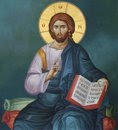Ο Άγιος Ευστάθιος γεννήθηκε στην πόλη Σίδη της
Παμφυλίας και υπήρξε μία από τις μεγάλες και εκκλησιαστικές μορφές του 3ου
και 4ου αιώνα μ.Χ. Άλλοι θεωρούν ότι καταγόταν από τους
Φιλίππους της Μακεδονίας. Ο Μέγας Αθανάσιος χαρακτηρίζει τον Άγιο Ευστάθιο
«άνδρα ομολογητήν». Τούτο σημαίνει ασφαλώς ότι υπέφερε κατά την διάρκεια των
διωγμών, είτε επί Διοκλητιανού
είτε επί Λικινίου.
Το
320 μ.Χ. εξελέγη Επίσκοπος Βέροιας της Συρίας και από εκεί μετατέθηκε το έτος
324 μ.Χ. στην Αντιόχεια. Παρευρεθείς στην Α’ Οικουμενική Σύνοδο, η οποία συνήλθε το έτος 325
μ.Χ. στη Νίκαια
της Βιθυνίας, καταδίκασε
τον αιρετικό
Άρειο και τους
οπαδούς αυτού.
Ο Άγιος εξακολουθούσε
να εργάζεται για την
διάδοση, αλλά και
τη στερέωση της Ορθοδοξίας
και συνδεόταν δια στενής φιλίας
με τον Άγιο Όσιο, Επίσκοπο
Κορδούης († 27 Αυγούστου).
Όμως
οι κορυφαίοι των οπαδών
του Αρείου, μεταξύ των οποίων
ήταν ο Νικομηδείας Ευσέβιος, ο
Νικαίας Θεόγνις και ο Καισαρείας Ευσέβιος, συνεκάλεσαν Σύνοδο
στην Αντιόχεια το έτος 330 μ.Χ. και
καθαίρεσαν τον Άγιο Ευστάθιο
ως αιρετικό.
Για να ενεργήσουν δε αποτελεσματικότερα έπλασαν και άλλα σε βάρος του εγκλήματα, ότι τάχα μιλούσε περιφρονητικά
για την μητέρα
του Μεγάλου Κωνσταντίνου,
Αγία Ελένη, και ότι προσήλθε σε αθέμιτες σχέσεις
με κάποια γυναίκα
από την οποία απέκτησε
και τέκνο. Έτσι κατόρθωσαν να
επιτύχουν την εξορία του Αγίου, κατά μερικούς
στους Φιλίππους
της Μακεδονίας, κατά άλλους δε στην
Τραϊανούπολη της Θρᾴκης,
όπου και κοιμήθηκε
με ειρήνη
το έτος 337 μ.Χ.
Η Αντιόχεια έμεινε πιστή στον Ορθόδοξο Επίσκοπό της και το έτος 482 μ.Χ. ζήτησε και έλαβε τα ιερά λείψανα αυτού από την Τραϊανούπολη.
Η Αντιόχεια έμεινε πιστή στον Ορθόδοξο Επίσκοπό της και το έτος 482 μ.Χ. ζήτησε και έλαβε τα ιερά λείψανα αυτού από την Τραϊανούπολη.
Απολυτίκιον. Ήχος γ’. Θείας πίστεως.
Θείας έμπλεως σοφίας πέλων, ώσπερ ήλιος, λαμπρός εκλάμπεις, εν τη Συνόδω τη Πρώτη Ευστάθιε· και τον Υιόν ομοούσιον Όσιε, ανακηρύττεις Πατρί και τω Πνεύματι. Αλλά πρέσβευε, ευστάθειαν αδιάπτωτον, δοθήναι Ιεράρχα τοις τιμώσί σε.
Θείας έμπλεως σοφίας πέλων, ώσπερ ήλιος, λαμπρός εκλάμπεις, εν τη Συνόδω τη Πρώτη Ευστάθιε· και τον Υιόν ομοούσιον Όσιε, ανακηρύττεις Πατρί και τω Πνεύματι. Αλλά πρέσβευε, ευστάθειαν αδιάπτωτον, δοθήναι Ιεράρχα τοις τιμώσί σε.
Κοντάκιον. Ήχος πλ. δ’. Τη υπερμάχω.
Ως εκκαθάρας
σεαυτόν ενθέοις πράξεσι
Αρχιερέων ανεδείχθης
θείον άγαλμα
Θεωρία και
αμέμπτω εμπρέπων βίω.
Αλλ’ ως στύλος Εκκλησίας
και εδραίωμα
Πειρασμών στερρώς
υπέμεινας την έφοδον.
Όθεν κράζομεν, χαίροις Πάτερ Ευστάθιε.
Όθεν κράζομεν, χαίροις Πάτερ Ευστάθιε.
Μεγαλυνάριον.
Τον Υιόν ομότιμον τω Πατρί, Πάτερ δογματίζων, και τω Πνεύματι συμφυή, της ομολογίας, τον στέφανον εδέξω, Ευστάθιε ποικίλαις, παλαίσας θλίψεσι.
Τον Υιόν ομότιμον τω Πατρί, Πάτερ δογματίζων, και τω Πνεύματι συμφυή, της ομολογίας, τον στέφανον εδέξω, Ευστάθιε ποικίλαις, παλαίσας θλίψεσι.
Saint Eustathius the
Patriarch of Antioch
Saint Eustathios was born
in the city of Sidis in Pamphylia and was one of the great and ecclesiastical
figures of the 3rd and 4th centuries AD. Others believe that he came from the
Philippians of Macedonia. Athanasius the Great describes Saint Efstathios as a
"confessor man". This certainly means that he suffered during the
persecutions, either on Diocletian or on Licinius.
In 320 AD was elected
Bishop of Veria of Syria and from there he was transferred in the year 324 AD.
in Antioch. Attend the First Ecumenical Council, which met in the year 325 AD
in Nice, Bithynia, he condemned the heretical Arius and his followers.
The Saint continued to
work for the dissemination and fortification of Orthodoxy and was associated
with a close friendship with the Holy One, Bishop Cordois († 27 August).
However, the leaders of the
Arius followers, including Nicomedia Eusebius, Nicaea Theogenis and Caesarea
Eusebius, convened a Synod in Antioch in the year 330 AD. and dismissed Saint
Efstathios as a heretic. In order to act more efficiently, other crimes were
committed against him, that he was talking contemptuously about Constantine the
Great's mother, St. Helen, and that he engaged in illicit relations with a
woman with whom he had a child. They were thus able to obtain the exile of the
Saint, some to Philippi in Macedonia and others to Trajanopolis, Thrace, where
he slept peacefully in the year 337 AD.
Antioch remained faithful
to its Orthodox Bishop and in the year 482 AD. asked for and received the
sacred relics of it from Trajan.
Absolutely. Sound c.
Divine faith.
The divine wisdom of
pellets, the scorching sun, the glittering lamp, in the Synod the First Stable;
and the Son-in-law Osier, proclaimers Patriot and the Spirit. But he kept,
without interruption, giving the Hierarch the honor.
It's close. Sound d. I
miss her.
As a liquid in this act of
injecting
Hierarchs' statue of a
great uncle
Theory and I am living
with a sense of humor.
But as a Church pillar and
stand
Temptation I endured it
all.
Everywhere we shout, happy
Father Eustathius.
Magnificent.
The Son of the Peer of the
Father, the Father of dogmatists, and the Father in the Spirit, of confession,
the crowning one, I stand for variety, old sadness.


Δεν υπάρχουν σχόλια:
Δημοσίευση σχολίου